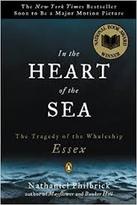 I just finished reading In the Heart of the Sea: The Tragedy of the Whaleship Essex by Nathaniel Philbrick. It was a gory, wild tale of the Nantucket whaling ship attacked by a whale, where only a few sailors barely survived to tell the tale. The story was riveting and unbelievable and was the inspiration for Melville's Moby Dick. It really got me thinking about the intensity of human clinging to life and ability to withstand extreme conditions. I can't believe how unlucky and lucky the survivors were at the same time: the captain managed to be on TWO whaling boats that sunk over the course of his career and yet managed to be saved by randomly passing ships. I was impressed with the sailors' abilities to rig up their lifeboats for sailing thousands of miles and to figure out where in the world they were without GPS/radio/etc. The in-depth details of whale and tortoise killings (as well as the cannibalism) were my least favorite parts of the book, though they showed me how deeply the author researched the story. I was sad to read about how xenophobia, racism, and disrespect for animals got these sailors into such trouble. Overall, it was a very entertaining story, and below are some of my notes. Preface Whaling industry Inspiration for Melville and moby dick 1 Nantucket island Superstitious about the sea Whale oil Separate island culture Equal pay for blacks Minimal pay for years of work with only months at home 2 countdown Not following safety procedures in storm Aggressive decision making No margin for error 3 first blood Special language for spotting whale There she blows Bloodlust for whale Minuscule food provisions 4 Mysteries in the Galapagos Problems on the ship Collecting tortoises for food and oil like with whales 5 Enormous size of pacific No caution in whale boats Noticed whale near them but didn't try to avoid Whale rammed ship Largest brain of any mammal Echolocation and clicks to communicate 6 the plan Avoided unknown islands like Tahiti which they were afraid of but much closer to them Suspicions of unknown Xenophobia Democratic leadership worse in disasters than authoritarian 7 at sea Daily rituals and log keeping for sanity Salvaged items and rigged up ghetto mast Damaged food provisions and thirst Prayer meetings Instinct to keep clinging together Could've stopped at Society Islands but decided to go on at sea 8 centering down 9 there is land Found island Afraid of savages Had to leave island again for real settlement 10 whisper of necessity Deaths to starvation 11 games of chance Leadership in impossible circumstances Shackleton Narrow hopes bound us to life (job) Casting lots to kill one to save others: one for who would die and who would kill But games of chance not allowed for Quakers 12 in the eagle's shadow Active passive approach to survival Give yourself up to what happens Found ship randomly sailing nearby when we're just about to die 13 homecoming Both ships saved by other ships Those left on island saved as well Public judging those who resorted to cannibalism Saved sailors returning home and telling story Went back to sailing 14 consequences Lunar observations to determine longitude New ship hit coral reef Had to be saved again Melville joined as sailor and read account of Essex Sailors coming back to new children of theirs Huge fire in Nantucket Whale population resilient but became angrier Another boat broken by whale in same waters Epilogue: bones Beached whale Bones are all that are left
0 Comments
Your comment will be posted after it is approved.
Leave a Reply. |
Archives
June 2024
Categories
All
Subscribe |
 RSS Feed
RSS Feed
